
ARD is a joint organisation of Germany's regional public-service broadcasters. It was founded in 1950 in West Germany to represent the common interests of the new, decentralised, post-war broadcasting services – in particular the introduction of a joint television network.
Das Erste is the flagship national television channel of the ARD association of public broadcasting corporations in Germany. Das Erste is jointly operated by the nine regional public broadcasting corporations that are members of the ARD.
Arte is a European public service channel dedicated to culture. It is made up of three separate companies: the Strasbourg-based European Economic Interest Grouping (EEIG) ARTE, plus two member companies acting as editorial and programme production centres, ARTE France in Paris and ARTE Deutschland in Baden-Baden.
PALplus is an analogue television broadcasting system aimed to improve and enhance the PAL format by allowing 16:9 aspect ratio broadcasts, while remaining compatible with existing television receivers, defined by International Telecommunication Union (ITU) recommendation BT.1197-1. Introduced in 1993, it followed experiences with the HD-MAC and D2-MAC, hybrid analogue-digital widescreen formats that were incompatible with PAL receivers. It was developed at the University of Dortmund in Germany, in cooperation with German terrestrial broadcasters and European and Japanese manufacturers. The system had some adoption across Europe during the late 1990s and helped introduce widescreen TVs in the market, but never became mainstream.
Südwestrundfunk, shortened to SWR, is a regional public broadcasting corporation serving the southwest of Germany, specifically the federal states of Baden-Württemberg and Rhineland-Palatinate. The corporation has main offices in three cities: Stuttgart, Baden-Baden and Mainz, with the director's office being in Stuttgart. It is a part of the ARD consortium.
Mitteldeutscher Rundfunk, shortened to MDR, is the public broadcaster for the federal states of Thuringia, Saxony and Saxony-Anhalt in Germany. Established in January 1991, its headquarters are in Leipzig, with regional studios in Dresden, Erfurt and Magdeburg. MDR is a member of the ARD consortium of public broadcasters in Germany.
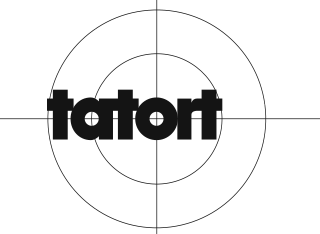
Tatort is a German-language police procedural television series that has been running continuously since 1970 with some 30 feature-length episodes per year, which makes it the longest-running German TV drama. Developed by the German public-service broadcasting organization ARD for their channel Das Erste, it is unique in its approach in that it is jointly produced by all of the organization's regional members as well as its partnering Austrian and Swiss national public-service broadcasters, whereby every regional station contributes several episodes to a common pool.
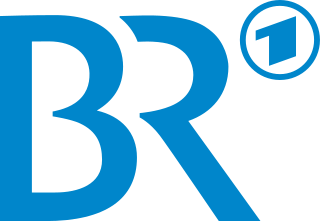
Bayerischer Rundfunk, shortened to BR, is a public-service radio and television broadcaster, based in Munich, capital city of the Free State of Bavaria in Germany. BR is a member organization of the ARD consortium of public broadcasters in Germany.

3sat is a free-to-air German-language public service television channel. It is a generalist channel with a cultural focus and is jointly operated by public broadcasters from Germany, Austria (ORF) and Switzerland. The coordinating broadcaster is ZDF, at whose Mainz facility the broadcasting centre with studios for in-house productions is located.
Television in Germany began in Berlin on 22 March 1935, broadcasting for 90 minutes three times a week. It was home to the first public television station in the world, named Fernsehsender Paul Nipkow.

Rundfunk Berlin-Brandenburg, commonly shortened to RBB, is an institution under public law for the German states of Berlin and Brandenburg, based in Berlin and Potsdam. RBB was established on 1 May 2003 through the merger of Sender Freies Berlin (SFB) and Ostdeutscher Rundfunk Brandenburg (ORB), based in Potsdam, and is a member of the Association of PSBs in the Federal Republic of Germany (ARD).
Sender Freies Berlin was the ARD public radio and television service for Berlin from 1 June 1954 until 30 April 2003. On 1 January 1992, SFB became the public broadcaster for the whole of reunited Berlin. However, SFB had long had a significant audience in East Berlin for some time before German reunification. On 1 May 2003 it merged with Ostdeutscher Rundfunk Brandenburg to form Rundfunk Berlin-Brandenburg.

Ostdeutscher Rundfunk Brandenburg, based in Potsdam, was the public broadcaster for the German federal state of Brandenburg from 12 October 1991 until 30 April 2003. It was a member organization of the consortium of public-law broadcasting organizations in Germany, ARD.
One is a German free-to-air television channel owned and operated by the German public-broadcasting consortium ARD. Managed since October 2005 by Westdeutscher Rundfunk on behalf of ARD as a whole, the channel was launched on 30 August 1997.
Tagesschau24 is a German free-to-air television channel owned by ARD and managed by Norddeutscher Rundfunk. It was launched on 30 August 1997 as "EinsExtra" before it became the current name on 1 May 2012.
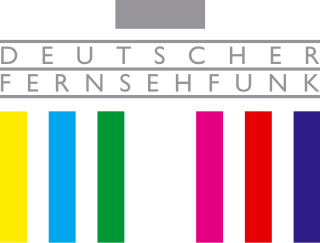
Deutscher Fernsehfunk was the state television broadcaster in the German Democratic Republic from 1952 to 1991.
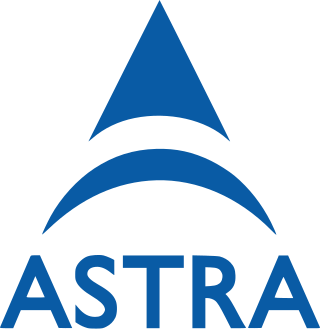
Astra 19.2°E is the name for the group of Astra communications satellites co-located at the 19.2°East orbital position in the Clarke Belt that are owned and operated by SES based in Betzdorf, Luxembourg.
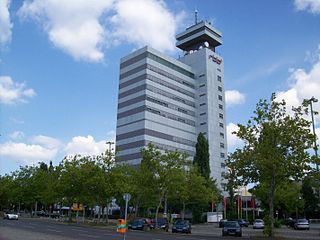
RBB Fernsehen is a German free-to-air television channel owned and operated by Rundfunk Berlin-Brandenburg (RBB) and serving Berlin and Brandenburg. It is one of the seven regional "third programmes" that are offered within the federal ARD network.
RBB Brandenburg was the third television channel for Brandenburg, (Germany) from January 1992 to March 2004. Until May 2003, it was organized by Ostdeutscher Rundfunk Brandenburg (ORB), then by its successor, Rundfunk Berlin-Brandenburg (RBB). On 1 March 2004, the two regional television channels of RBB – RBB Brandenburg and RBB Berlin – were integrated into the new rbb Fernsehen.
ZDF Musikkanal was the name of a television channel operated by ZDF which had started broadcasting on 1 January 1984 as part of the cable pilot projects in West Germany. The station broadcast a moderated programme with a thematic focus on music. The programmes broadcast came almost exclusively from the archives of the ZDF main programme.










